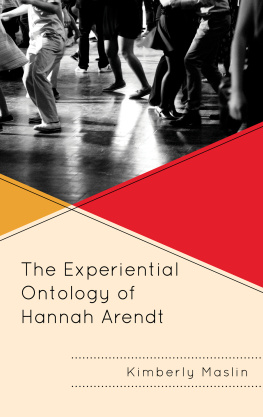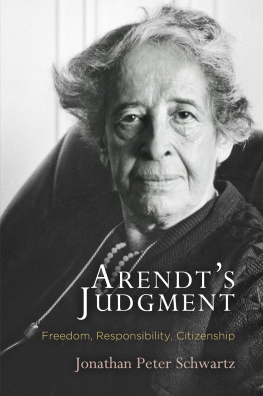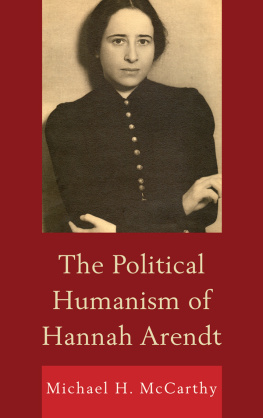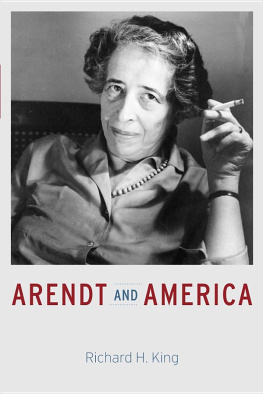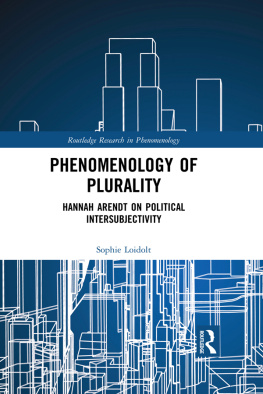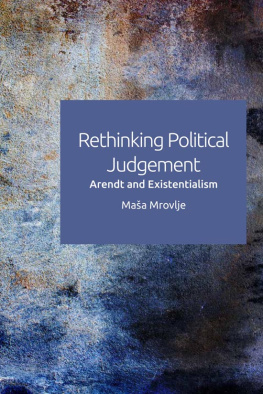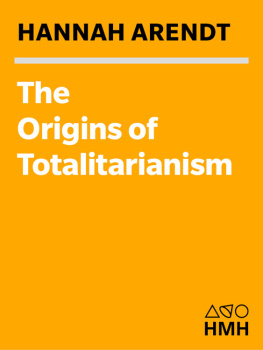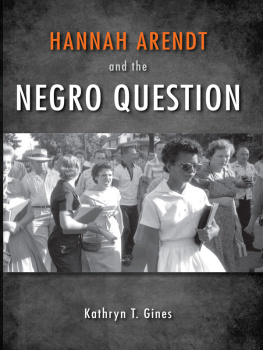Kimberly Maslin - The Experiential Ontology of Hannah Arendt
Here you can read online Kimberly Maslin - The Experiential Ontology of Hannah Arendt full text of the book (entire story) in english for free. Download pdf and epub, get meaning, cover and reviews about this ebook. year: 2012, publisher: undefined, genre: Romance novel. Description of the work, (preface) as well as reviews are available. Best literature library LitArk.com created for fans of good reading and offers a wide selection of genres:
Romance novel
Science fiction
Adventure
Detective
Science
History
Home and family
Prose
Art
Politics
Computer
Non-fiction
Religion
Business
Children
Humor
Choose a favorite category and find really read worthwhile books. Enjoy immersion in the world of imagination, feel the emotions of the characters or learn something new for yourself, make an fascinating discovery.
- Book:The Experiential Ontology of Hannah Arendt
- Author:
- Publisher:undefined
- Genre:
- Year:2012
- Rating:5 / 5
- Favourites:Add to favourites
- Your mark:
- 100
- 1
- 2
- 3
- 4
- 5
The Experiential Ontology of Hannah Arendt: summary, description and annotation
We offer to read an annotation, description, summary or preface (depends on what the author of the book "The Experiential Ontology of Hannah Arendt" wrote himself). If you haven't found the necessary information about the book — write in the comments, we will try to find it.
The Experiential Ontology of Hannah Arendt — read online for free the complete book (whole text) full work
Below is the text of the book, divided by pages. System saving the place of the last page read, allows you to conveniently read the book "The Experiential Ontology of Hannah Arendt" online for free, without having to search again every time where you left off. Put a bookmark, and you can go to the page where you finished reading at any time.
Font size:
Interval:
Bookmark:
The Experiential Ontology of
Hannah Arendt
The Experiential Ontology of
Hannah Arendt
Kimberly Maslin
LEXINGTON BOOKS
Lanham Boulder New York London
Published by Lexington Books
An imprint of The Rowman & Littlefield Publishing Group, Inc.
4501 Forbes Boulevard, Suite 200, Lanham, Maryland 20706
www.rowman.com
6 Tinworth Street, London SE11 5AL, United Kingdom
Copyright 2020 by The Rowman & Littlefield Publishing Group, Inc.
All rights reserved. No part of this book may be reproduced in any form or by any electronic or mechanical means, including information storage and retrieval systems, without written permission from the publisher, except by a reviewer who may quote passages in a review.
British Library Cataloguing in Publication Information Available
Library of Congress Control Number: 2020933364
Library of Congress Cataloging-in-Publication Data Is Available
ISBN 978-1-7936-1244-1 (cloth: alk. paper)
ISBN 978-1-7936-1245-8 (electronic)
 TM The paper used in this publication meets the minimum requirements of American National Standard for Information Sciences Permanence of Paper for Printed Library Materials, ANSI/NISO Z39.48-1992.
TM The paper used in this publication meets the minimum requirements of American National Standard for Information Sciences Permanence of Paper for Printed Library Materials, ANSI/NISO Z39.48-1992.
EBSCO Publishing : eBook Collection (EBSCOhost) - printed on 7/15/2020 12:24 AM via MCGILL UNIV
AN: 2481135 ; Kimberly Maslin.; The Experiential Ontology of Hannah Arendt
Account: s1226075
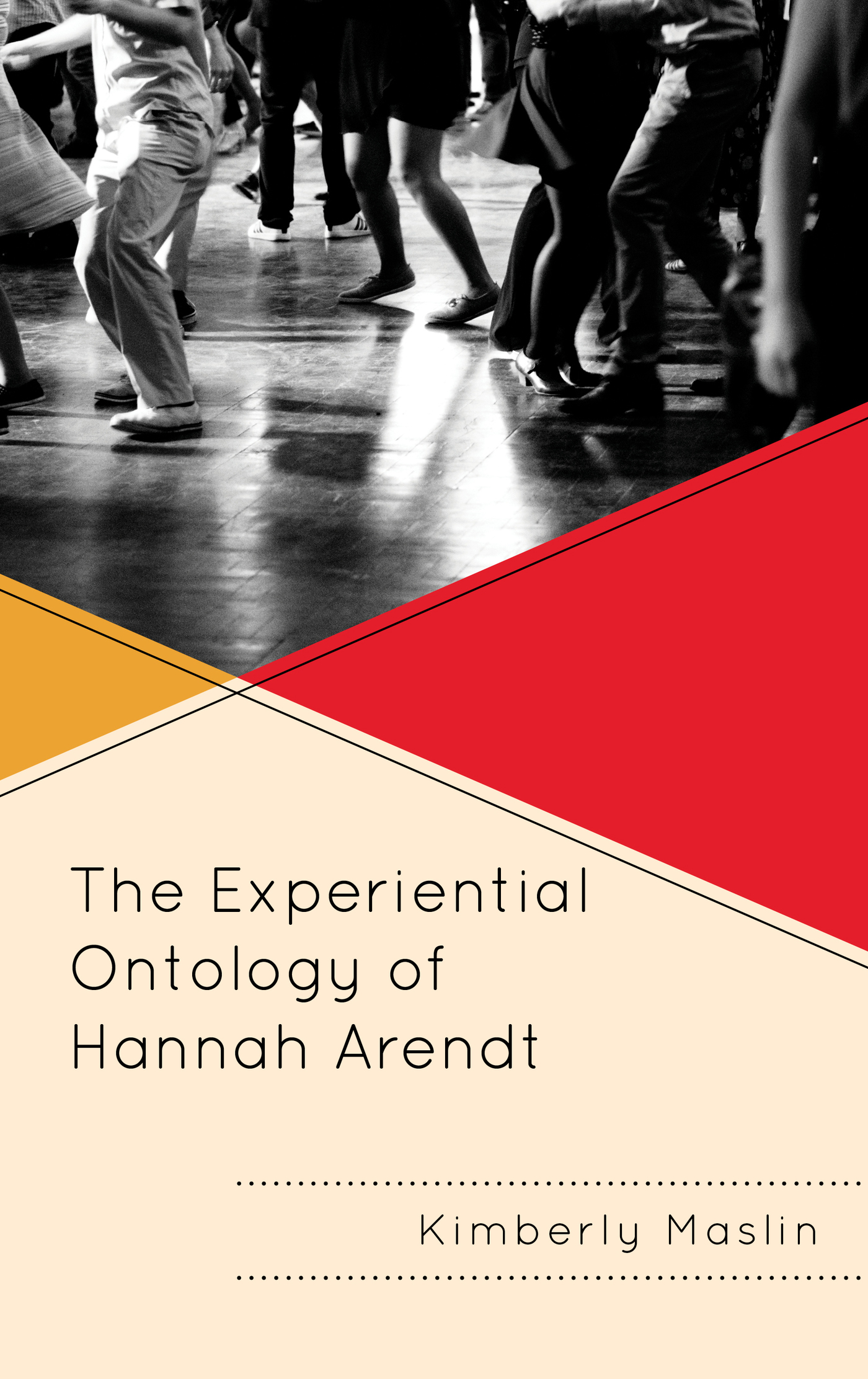
The recent publication of Martin Heideggers Black Notebooks has led to a resurgence of interest in his affiliation with National Socialism. Most of the first wave of scholarship following the publication of these notebooks focused on the question(s) of whether or not Heideggers antisemitism had a philosophical grounding and the implications for philosophy of answering this question in the affirmative. Although these efforts produced a fascinating body of scholarship, the latter question strikes me as off the mark, which is to say it takes us down a dead end path and, in the process, it misses a productive line of inquiry. The question of Heideggers moral standing in philosophy misses the mark and the risk we run, in dismissing Heidegger as morally bankrupt, is that despite his shortcomings, he has important things to teach us about identity. Not in spite of, but because of, his disastrous foray into the political sphere, his students struggled with a particular set of questions. Despite her intense disappointment, Hannah Arendt was unable to abandon either existential philosophy or Heideggers basic precepts. These precepts help us understand Heideggers own failure, by suggesting that even the great philosopher existed in the world in a state of thrownness, simultaneously transcending and falling prey to his own throw. Given that falling prey and projectivity represent the quintessential human struggle, ever present in our daily lives, why would we expect Martin Heidegger to be exempt from this most human of all challenges?
Hannah Arendt shifts to political philosophy, less to escape her own personal disappointment than to reveal (and ultimately remedy) the flaws of fundamental ontology. She not only grew beyond the role of nave and beguiled student: she became one of Heideggers most astute critics. Well acquainted with and deeply respectful of his contributions to existential philosophy, Arendt viewed Heideggers work both as profoundly insightful and extraordinarily myopic. Moreover, not contented to simply offer a critique of her mentors work, Arendt engaged in a lifelong struggle to come to terms with the political implications of fundamental ontology. In short, Arendts goals are more distinctly Heideggerian than previous scholarship would have us believe. Moreover, I suggest that Arendts work, far from rejecting fundamental ontology, may be to offer a politically responsive, hence responsible, modification of Heideggers fundamental ontology. In other words, she suggests that Heideggers descriptive and non-normative insight into the nature of being is necessarily incomplete, and potentially irresponsible, unless it is undertaken in a manner which is mindful of the collective implications, as such she constructs an experiential ontology. Drawing on Heideggers fundamental ontology, she turns our attention to the ways in which concrete structures and experiences in the world shape our manner of being. In so doing, she illustrates the importance of political ontology.
Many have noted the Heideggerian impulse in The Human Condition and the philosophical preoccupation of The Life of the Mind. In this vein, The Human Condition is sometimes described as Arendts return to philosophy. It is my contention that Arendt never returns to philosophy because she never leaves it. Rather, her entire oeuvre can be understood as an attempt to modify Heideggers descriptive framework for use in the political sphere, because philosophy and politics, perhaps particularly existential philosophy and democratic theory, are utterly inseparable. Her Heideggerian roots are not something Arendt returns to, rather she uses Heideggers insight into the nature of Being to help us understand the plight of the nineteenth-century Jewess, the development of antisemitism, as well as, imperialism. My claim is that all of Arendts work can be read as existential philosophy; my aim is to reveal the Heideggerian impulse in her early work, in particular. In what follows, I argue, first, that our reading of Arendt is informed by an examination of the Heideggerian concepts underlying it. Second, Arendts project, far from rejecting fundamental ontology, may be to offer a politically responsive, hence responsible, modification of Heideggers fundamental ontology, by grounding it in lived experiences, hence her work should be read as experiential ontology.
In the first chapter I examine Arendts Heidegger the Fox essay, suggesting that Arendt uses the metaphor of a physical trap to both conceal and reveal her critique of Heidegger. She opines that Heideggers approach to fundamental ontology leaves him unable to extricate himself from his own conceptual framework. Heideggers project is to develop fundamental ontology and to reveal the limitations of philosophy as a mode of inquiry under conditions of modernity. Ironically he becomes so thoroughly subsumed by ontological questions that he fails to recognize that he has fallen victim to several of his own concerns about modernity. In the second chapter, I examine the role of rootlessness in the thought of both Heidegger and Arendt. Though their politics differ, both assert that a lack of grounding in a particular place lies at the core of the Jewish problem. Moreover, their notions of rootlessness are strikingly similar as both derive from a deficient connectedness and lead to an inauthentic manner of being-in-the-world. The third chapter takes up the often overlooked, Rahel Varnhagen, arguing it should be read as a case study of three of Heideggers most political concepts: thrownness, fallenness and projectivity. In short, Arendt undertakes an examination of Varnhagens life in order to thickly constitute thrownness, fallenness, and projectivity, to reveal the ontological core of rootlessness, as well as the political implications of taking oneself up as a project.
Next pageFont size:
Interval:
Bookmark:
Similar books «The Experiential Ontology of Hannah Arendt»
Look at similar books to The Experiential Ontology of Hannah Arendt. We have selected literature similar in name and meaning in the hope of providing readers with more options to find new, interesting, not yet read works.
Discussion, reviews of the book The Experiential Ontology of Hannah Arendt and just readers' own opinions. Leave your comments, write what you think about the work, its meaning or the main characters. Specify what exactly you liked and what you didn't like, and why you think so.

